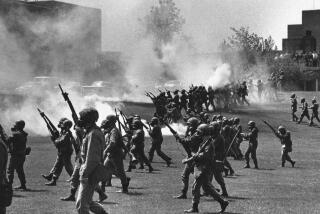Thinking of Daryl Gates and Capt. Queeg : BILL BOYARSKY
As I watched Police Chief Daryl F. Gates’ news conference Friday night, I thought of Capt. Philip Francis Queeg, the flawed skipper in the film “The Caine Mutiny.”
Queeg was a paranoid commander who blew up when he thought crew members stole his strawberries. And when Capt. Queeg was under stress, he pulled out three steel balls from his pocket and rolled them in his hand.
Chief Gates engages in none of this behavior, as far as I know. But life may not be much more pleasant on the sixth floor of Parker Center than it was on the minesweeper Caine. I’ve been told Gates displays the symptoms of the bunker mentality suffered by leaders under heavy pressure. He talks only to a few loyalists. He’s suspicious of many of those around him.
Nothing as bad as Queeg. But at the news conference, as one hostile question followed another, I was reminded of a powerful scene from the masterpiece film made from the novel by Herman Wouk.
Queeg, played by Humphrey Bogart, is being questioned by Lt. Barney Greenwald. Greenwald is the attorney for Lt. Steve Maryk, who is being court-martialed for mutiny against Queeg. At the beginning, Queeg is brisk and confident. But as Greenwald, portrayed by Jose Ferrer, bores in, Queeg grows tense and his eyes begin to dart about. At that moment, he pulls out the three steel balls and the court-martial judges see the real Queeg.
In the same way, we saw the real Gates at the news conference. The macho self-confidence, the Gates persona, were gone. What was left was a tired, shaken man with a husky, hesitant voice who couldn’t explain what went wrong.
From the outset of the riots, when looting and fires were spreading around the city, people wondered about the slow deployment of the LAPD.
The question arose that Wednesday night, even among a group of residents who presumably were Gates fans, guests at a Brentwood fund-raiser for the campaign against Proposition F, the charter amendment on police reform.
Gates, who opposes the measure, was there, even though the situation on the streets was already bad. A guest asked him about people being pulled from cars and “literally beaten to death.” Gates said it “takes a little bit of time” to establish control and “there are going to be situations where people are without assistance. That’s just the facts of life.”
When the post-mortems began after the riot, Gates at first refused to explain. “My judgment was not wrong,” he said in one interview, pounding his hand on his chair to emphasize the point. “And I’m sick of answering that question. We were properly deployed.”
As the week wore on, he seemed to concede that the cops’ performance didn’t measure up.
He looked for scapegoats. The press and the politicians were villains. “I know police officers on the street are scared to death to use any kind of force because they think they’re going to be second-guessed,” he said.
Another villain was the Police Commission, which was “second-guessing everything I did.”
There were his top-echelon subordinates. “Certainly in the initial phases we are due for criticism,” he said last Wednesday. While sergeants and patrol officers “performed magnificently . . . the breakdown occurred above them. . . .”
But as this past week went on, as critics grew in number, the chief stood alone.
The reporters punched away at him at the news conference. One asked him about attending the fund-raiser and whether it contributed to riot control being botched. At one time, this bluntly asked question would have been answered with a sneer and, most likely, a direct attack on the reporter or his employer. Not on Friday.
“You’re right, I was at a function,” he said. “You’re right. I should not have been at that function. You’re right, I should have turned around when I heard some of those things happening. . . .”
Other questions were just as hostile. Gates took them, not fighting back.
More than his macho veneer had been stripped away from Gates. What also went was the illusion of a man in charge of his department.
For at day’s end, he still had not explained to the city what went wrong. This time he exonerated his fellow brass and pinned the blame on the lieutenant in charge of pacifying the first outbreak at Normandie and Florence avenues. As for the rest of the operation, he said, “We had some glitches.”
Glitches? A glitch is a minor mishap. The rioting all over the city couldn’t be called a glitch.
Friday’s news conference may have shown a humbled Daryl Gates, but that’s little comfort to Los Angeles residents worried about their safety. Gates is not leaving until some time in June, and if disaster strikes again, he and his team will be in charge.
More to Read
Get the L.A. Times Politics newsletter
Deeply reported insights into legislation, politics and policy from Sacramento, Washington and beyond. In your inbox three times per week.
You may occasionally receive promotional content from the Los Angeles Times.










